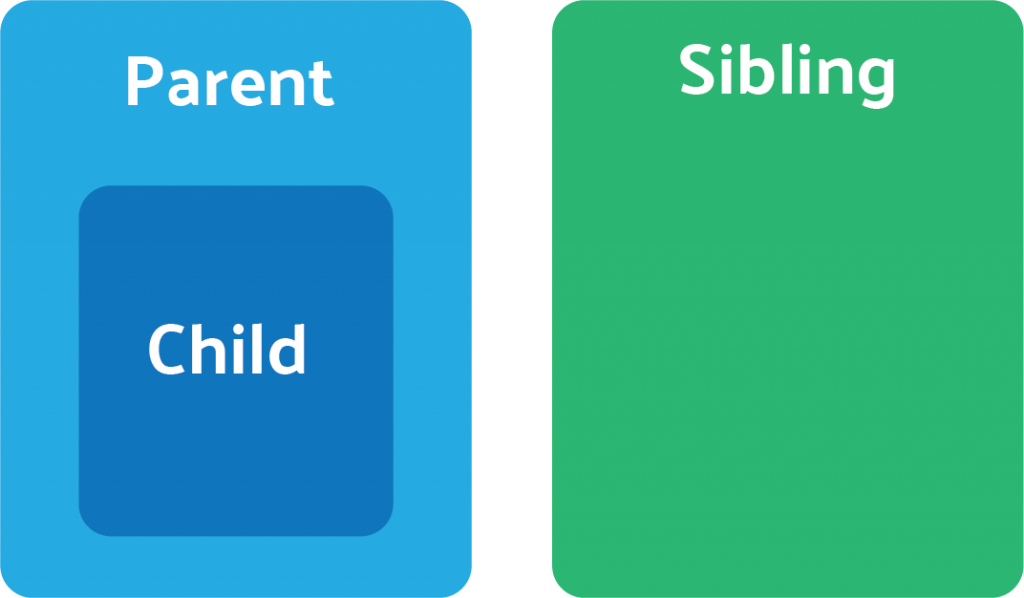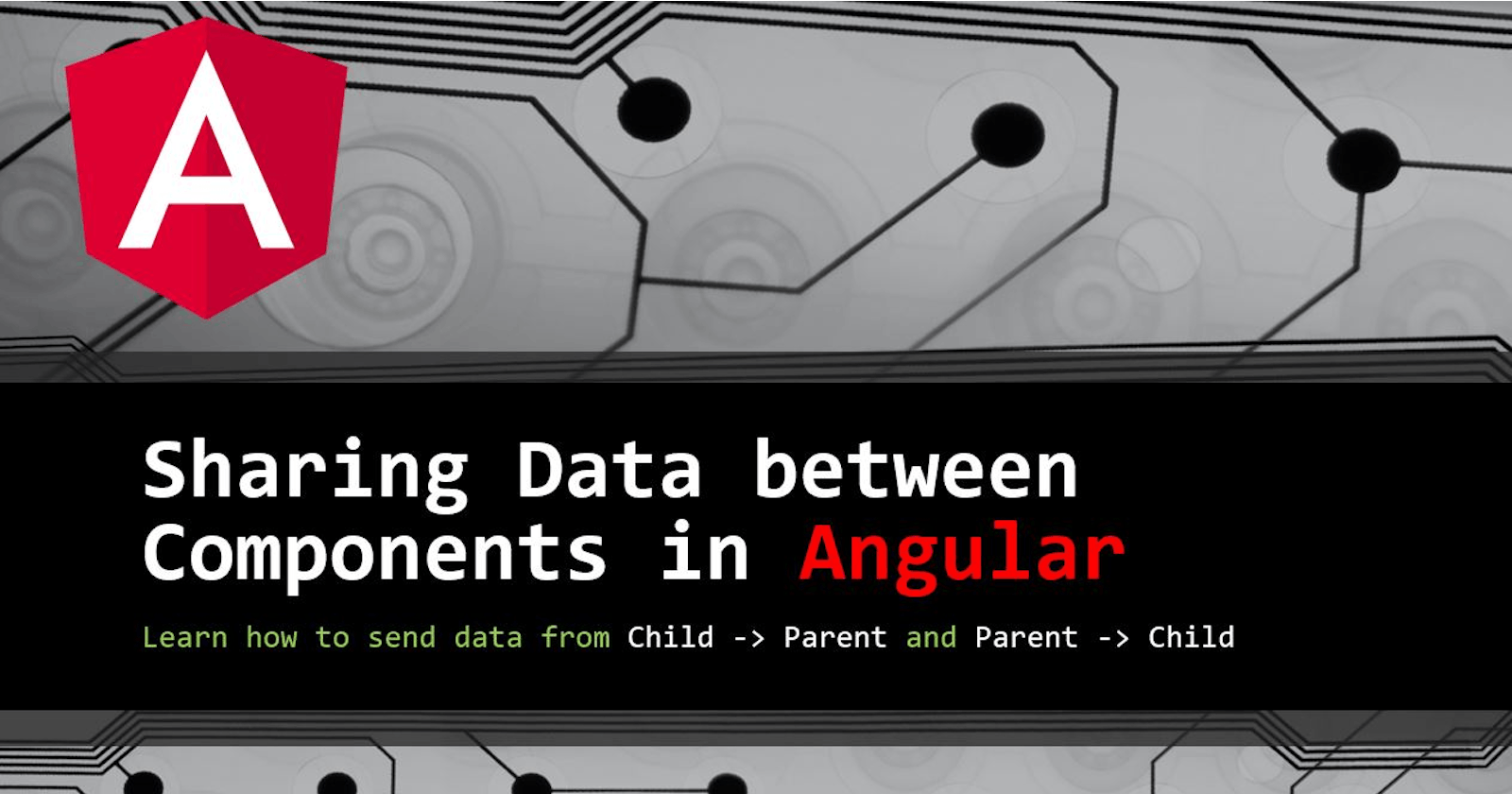Sharing Data between Components in Angular
Learn how to send data from Child -> Parent and Parent -> Child
Hello everyone!
One biggest feature of component based frameworks like Angular is the ability of sharing the data between different components. Based on the structure of the project and context of the use case, we may need to pass the data from parent to child components or child to parent components or even pass between the siblings.
So, in this article I am going to explain you four different ways to share data between Angular components. These are:
- Parent to Child: Sharing Data via
@Input - Child to Parent: Sharing Data via
ViewChild - Child to Parent: Sharing Data via
Output()andEventEmitter - Unrelated Components: Sharing Data with a Service
 (Photo: Parent and Child structure of angular components.)
(Photo: Parent and Child structure of angular components.)
1. Parent to Child: Sharing Data via @Input
This is probably the most common and straightforward method of sharing data. It works by using the @Input() decorator to allow data to be passed via the template.
parent.component.ts
import { Component } from '@angular/core';
@Component({
selector: 'app-parent',
template: `
<app-child [childMessage]="parentMessage"></app-child>
`,
styleUrls: ['./parent.component.css']
})
export class ParentComponent{
parentMessage = "message from parent"
constructor() { }
}
child.component.ts
import { Component, Input } from '@angular/core';
@Component({
selector: 'app-child',
template: `
Say {{ message }}
`,
styleUrls: ['./child.component.css']
})
export class ChildComponent {
@Input() childMessage: string;
constructor() { }
}
When you declare a variable with the @Input decorator in the child component, it allows that variable to be received from a parent template. In this case, we define a message variable in the parent, then use square brackets [childMessage] to pass the data to the child. Now the child can display this data in its own template.
2. Child to Parent: Sharing Data via ViewChild
ViewChild allows a one component to be injected into another, giving the parent access to its attributes and functions. One caveat, however, is that child won’t be available until after the view has been initialized. This means we need to implement the AfterViewInit lifecycle hook to receive the data from the child.
parent.component.ts
import { Component, ViewChild, AfterViewInit } from '@angular/core';
import { ChildComponent } from "../child/child.component";
@Component({
selector: 'app-parent',
template: `
Message: {{ message }}
<app-child></app-child>
`,
styleUrls: ['./parent.component.css']
})
export class ParentComponent implements AfterViewInit {
@ViewChild(ChildComponent) child;
constructor() { }
message:string;
ngAfterViewInit() {
this.message = this.child.message
}
}
child.component.ts
import { Component} from '@angular/core';
@Component({
selector: 'app-child',
template: `
`,
styleUrls: ['./child.component.css']
})
export class ChildComponent {
message = 'Hola Mundo!';
constructor() { }
}
In the AfterViewInit function we can access the message variable defined in the child.
3. Child to Parent: Sharing Data via Output() and EventEmitter
Another way to share data is to emit data from the child, which can be listed to by the parent. This approach is ideal when you want to share data changes that occur on things like button clicks, form entries, and other user events.
In the parent, we create a function to receive the message and set it equal to the message variable.
In the child, we declare a messageEvent variable with the Output decorator and set it equal to a new event emitter. Then we create a function named sendMessage that calls emit on this event with the message we want to send. Lastly, we create a button to trigger this function.
The parent can now subscribe to this messageEvent that’s outputted by the child component, then run the receive message function whenever this event occurs.
parent.component.ts
import { Component } from '@angular/core';
@Component({
selector: 'app-parent',
template: `
Message: {{message}}
<app-child (messageEvent)="receiveMessage($event)"></app-child>
`,
styleUrls: ['./parent.component.css']
})
export class ParentComponent {
constructor() { }
message:string;
receiveMessage($event) {
this.message = $event
}
}
child.component.ts
import { Component, Output, EventEmitter } from '@angular/core';
@Component({
selector: 'app-child',
template: `
<button (click)="sendMessage()">Send Message</button>
`,
styleUrls: ['./child.component.css']
})
export class ChildComponent {
message: string = "Hola Mundo!"
@Output() messageEvent = new EventEmitter<string>();
constructor() { }
sendMessage() {
this.messageEvent.emit(this.message)
}
}
4. Unrelated Components: Sharing Data with a Service
When passing data between components that lack a direct connection, such as siblings, grandchildren, etc, you should you a shared service. When you have data that should aways been in sync, I find the RxJS BehaviorSubject very useful in this situation.
You can also use a regular RxJS Subject for sharing data via the service, but here’s why I prefer a BehaviorSubject.
- It will always return the current value on subscription - there is no need to call
onnext - It has a
getValue()function to extract the last value as raw data. - It ensures that the component always receives the most recent data.
In the service, we create a private BehaviorSubject that will hold the current value of the message. We define a currentMessage variable handle this data stream as an observable that will be used by the components. Lastly, we create function that calls next on the BehaviorSubject to change its value.
The parent, child, and sibling components all receive the same treatment. We inject the DataService in the constructor, then subscribe to the currentMessage observable and set its value equal to the message variable.
Now if we create a function in any one of these components that changes the value of the message. when this function is executed the new data it’s automatically broadcast to all other components.
data.service.ts
import { Injectable } from '@angular/core';
import { BehaviorSubject } from 'rxjs';
@Injectable()
export class DataService {
private messageSource = new BehaviorSubject('default message');
currentMessage = this.messageSource.asObservable();
constructor() { }
changeMessage(message: string) {
this.messageSource.next(message)
}
}
parent.component.ts
import { Component, OnInit } from '@angular/core';
import { DataService } from "../data.service";
import { Subscription } from 'rxjs';
@Component({
selector: 'app-parent',
template: `
{{message}}
`,
styleUrls: ['./sibling.component.css']
})
export class ParentComponent implements OnInit, OnDestroy {
message:string;
subscription: Subscription;
constructor(private data: DataService) { }
ngOnInit() {
this.subscription = this.data.currentMessage.subscribe(message => this.message = message)
}
ngOnDestroy() {
this.subscription.unsubscribe();
}
}
sibling.component.ts
import { Component, OnInit } from '@angular/core';
import { DataService } from "../data.service";
import { Subscription } from 'rxjs';
@Component({
selector: 'app-sibling',
template: `
{{message}}
<button (click)="newMessage()">New Message</button>
`,
styleUrls: ['./sibling.component.css']
})
export class SiblingComponent implements OnInit, OnDestroy {
message:string;
subscription: Subscription;
constructor(private data: DataService) { }
ngOnInit() {
this.subscription = this.data.currentMessage.subscribe(message => this.message = message)
}
ngOnDestroy() {
this.subscription.unsubscribe();
}
newMessage() {
this.data.changeMessage("Hello from Sibling")
}
}
Conclusion
Here I have explained you the four ways of sharing the data between the components in Angular. Hope it helps to you in some kind and also I hope you learned something new today!

